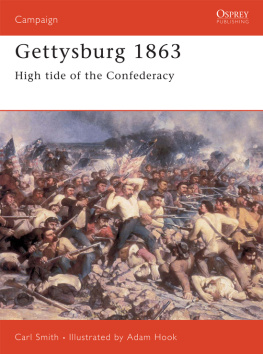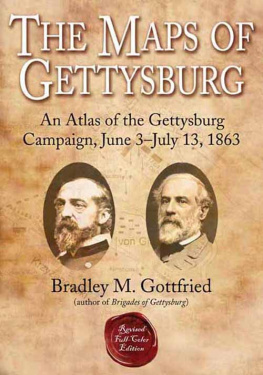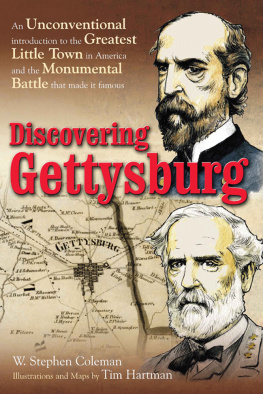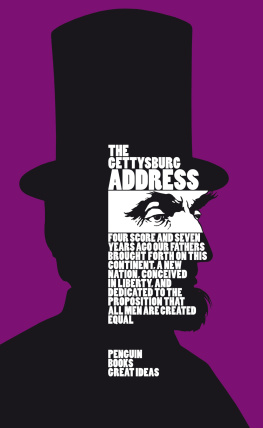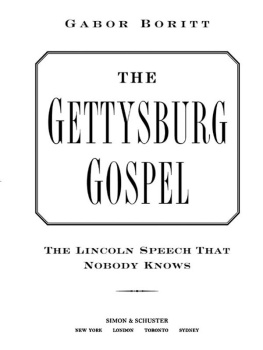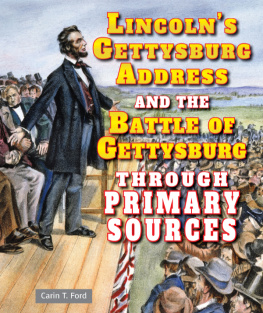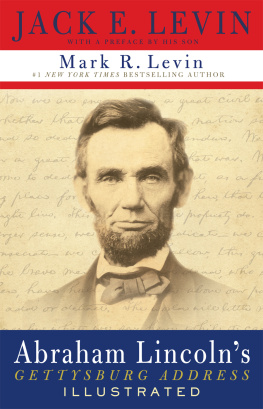Copyright 2010 by William Marvel
ALL RIGHTS RESERVED
For information about permission to reproduce selections from this book, write to Permissions, Houghton Mifflin Harcourt Publishing Company, 215 Park Avenue South, New York, New York 10003.
www.hmhco.com
The Library of Congress has cataloged the print edition as follows:
Marvel, William.
The great task remaining : the third year of Lincolns war / William Marvel.
p. cm.
Includes bibliographical references and index.
ISBN 978-0-618-99064-1
1. United StatesHistoryCivil War, 18611865Campaigns. 2. Lincoln, Abraham, 18091865Military leadership. 3. United StatesPolitics and government18611865Decision making. I. Title.
E 471. M 366 2010
973.7092dc22 2009029921
e ISBN 978-0-547-48714-4
v3.0214
For
Judge John L. Hurley
(18871962)
Bowdoin College
Class of 1908
A lifelong Lincoln scholar who bequeathed me his library and his fascination with that president; through him I shook the hand that shook the hands of John L. Sullivan and Joshua Chamberlain
List of Illustrations and Maps
Illustrations are from the Library of Congress unless otherwise credited.
BEGINNING PAGE
Camp of the 150th Pennsylvania
President Lincoln reviewing the cavalry
Contrabands at work on the Mississippi
The 1st U.S. Colored Infantry
The Sixth Corps below Fredericksburg
Fort Sumter after the Union assault
Exchanging wounded after Chancellorsville
Clement Vallandigham
The attacks on Port Hudson
Cartoon lampooning General Burnside
Porters fleet passing Vicksburg
Union encampment at Vicksburg
Pennsylvanian Gratitude
Gettysburg casualty
Governor Seymour and the mob
Execution procession
Encampment outside Culpeper
BEGINNING PAGE
John Minor Botts and family
Sutlers tent at Brandy Station
Dedication of Gettysburg National Cemetery
Chattanooga depot and Lookout Mountain
Fort Sanders, at Knoxville
Major General William H. French
Rapidan ford (National Archives)
Brigadier General Henry Prince
Columbia Demands Her Children!
The Recruiting Business
Entering Andersonville
Brigadier General Judson Kilpatrick
The Metropolitan Fair buildings
Inside at the fair
Red River campaign
MAPS
All maps are by Catherine Schneider.
The Eastern Theater
The Western Theater
Chancellorsville, Gettysburg, and Mine Run
Morgans Raid
Chattanooga, Knoxville, and East Tennessee
The Red River Campaign
Preface
The Civil War has fascinated me for as long as I can remember. By the time I was five my interest in it had already become so obvious that my mother started cultivating it, beginning with the day she introduced me to an ancient woman who, when she was five herself, had seen the Union army march into Savannah. My preoccupation with that epoch caught the attention of schoolmates and the yearbook staff at my high school, and despite the early lapse of my formal education I continued to study American history quite seriously, with special emphasis on that particular period. Like most amateur historians, I began with simplistic assumptions, including the belief that I needed only to memorize a long and complicated series of events and anecdotes to learn the war, much as cub riverboat pilot Sam Clemens learned the Mississippi River.
Such naive expectations should have withered before the competing images of the war as an altruistic abolition crusade and as a courageous struggle for agrarian survival, but then those partisan myths merged into a single nationalistic legend, bristling with an odd combination of religious and metallurgical metaphor. According to this compromise interpretation, the war served as a human sacrificea collective crucifixion, as it were, for the expiation of national sinwhile the crucible of conflict forged a new and stronger nation from the wreckage of two antagonistic societies. That was the gospel of Lincoln, and it has become the New Testament of American history, crowding out the memory of other points of view that enjoyed considerable popularity and even validity in their day. Because those other viewpoints did not prevail, they tend to suffer at the hands of historians who are, themselves, indelibly influenced by the one that did triumph.
Today, the Northern war effort is generally viewed as a struggle of almost single-minded devotion to national unity by a majority of citizens, who were impeded by the obstructionism of a stubborn, deluded minority. Antiwar Democrats are usually vilified now as racially prejudiced, which was usually true enough, but so were most of the War Democratsas well as many of the Republicans with whom they allied themselves. The peace faction is characterized as having operated on mistaken political premises, and that was often true, too, but the war party sometimes misjudged the political winds, as well. Through the distorted lenses of hindsight and presentism, though, Northerners who opposed the Lincoln administration are now seen as the villains of Civil War history, lurking like a fifth column to foil freedom, sustain slavery, and destroy the country.
The number of people who opposed the war at one time or another probably exceeds common impressions, for antiwar sentiment can now be found with increasing ease in burgeoning manuscript repositories. Attitudes about the conflict also changed frequently, and the degree of popular support fluctuated with each military defeat, or victory, and with each new, previously inconceivable federal intrusion into constitutional territory. The invisible constituency of women, who were not allowed to vote, provides some of the most virulent criticism of Lincolns administration: many soldiers wives showed dissatisfaction with the bloodshed, and with their husbands subordination of family interests to a national devotion they did not especially share. From the beginning of the war to the end, for that matter, the soldiers themselves often revealed that love of country did not provide their principal motive for taking arms, if it motivated them at all.
The mercenary element in the creation of the Union army formed a significant theme in Mr. Lincoln Goes to War, which became the first in a projected four-volume reexamination of the entire war. The second volume of that tetralogy appeared as Lincolns Darkest Year, in which the mercenary impulse accelerated as timid and vacillating leadership undermined Northern arms and prolonged the conflict. This third volume opens in March of 1863, as the Northern public reeled between two periods of abysmal morale: the useless bloodbath at Fredericksburg lay three months behind, and the disaster at Chancellorsville six weeks ahead. Spirits revived partially in the interim, only to plunge all the more precipitately after the second defeat, and by late June the peace movement had probably reached the peak of its wartime momentum. That momentum carried beyond even the Union victories of early July, which seemed briefly to foretell the collapse of the rebellion. Then Confederates in the East escaped annihilation after Gettysburg, resuming the offensive by October, while Confederates in the West recovered from Vicksburg and a summer-long retreat to trounce the Union army at Chickamauga Creek. The Northern citizen might be forgiven for wondering whether the war could ever be won, if the Confederacy could spring so vigorously back to life after such rare and signal Union triumphs.
The same phenomenon recurred after the sweeping victory at Chattanooga in November, which put the main Confederate army of the West to abject flight. The glow of that achievement was immediately dimmed when Robert E. Lee foiled a similarly promising maneuver in Virginia, and the following winter saw a series of Union defeats and embarrassments that again seemed to demonstrate the Souths unlimited powers of rejuvenation. After all the successes won by the national army in the second half of 1863, by the spring of 1864 war-weariness and opposition to the administration had again reached critical levels, at least on the home front.
Next page



